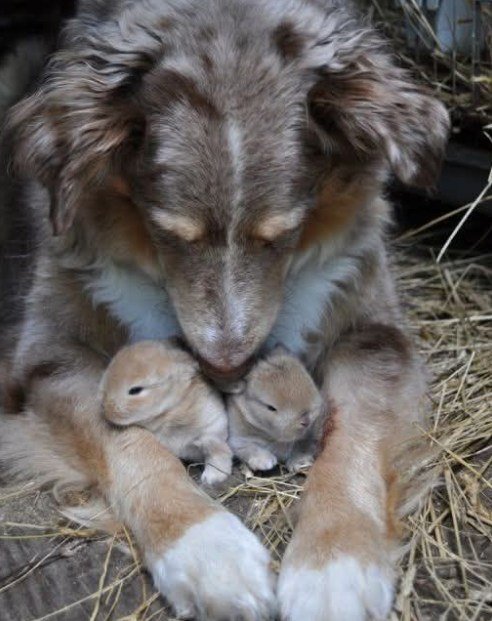The Garden Thief That Changed Everything I Thought I Knew
Every morning, I’d head out to check the garden—and come back fuming. Carrots, half-eaten. Lettuce, yanked from the ground. A bean vine, gnawed clean through. Determined to catch the culprit, I installed a motion-activated light and a trail cam. I was ready for raccoons, maybe a fox, even a desperate deer. What I wasn’t ready for was the truth—how it would quietly undo me, and then rebuild me in the same breath.
It all began the morning Runa didn’t come for breakfast.
She’s never been the needy type. There’s some shepherd in her, but it’s her spirit that’s always stood out—independent, strong-willed, wild around the edges. Even as a pup, she’d curl up under the porch during thunderstorms, refusing to come inside. But something in her shifted after her last litter didn’t survive. The spark faded. She stopped playing, stopped chasing anything at all. She slept more. Wandered off more. Sometimes she’d spend whole nights in the barn, silent and alone.
That morning felt different. Maybe it was instinct. Maybe guilt—I hadn’t exactly been patient with her lately. I’d been too distracted, too angry at the garden raids, too busy chasing shadows. So I grabbed a biscuit from the jar, laced up my boots, and made my way to the barn.
The light slanted through the wooden slats in gold streaks. Dust floated in the quiet air. The usual smells—hay, old tools, motor oil—wrapped around me. But there was something else. A sound, faint and trembling.
I followed it around the hay bales, crouching near the forgotten stack of crates.
There it was again.
A low, fragile whimper.
I leaned in—and saw her. Runa, curled tightly behind the crates, body tense, eyes locked on mine. I whispered her name, careful not to startle her. She didn’t bolt. She didn’t growl. She just watched me with those deep amber eyes, filled with something I couldn’t name—grief, maybe. Or a kind of hope.
Then I noticed what she was guarding.
Two tiny shapes nestled into her belly. At first glance, I thought they were puppies—maybe abandoned, maybe rescued. But no. They weren’t dogs at all.
They were baby rabbits.
Their eyes were still closed. Barely breathing. Fragile as fallen petals. And Runa, my squirrel-chasing, rabbit-barking dog, was nursing them. Cleaning them. Keeping them warm.
I didn’t move. Just watched, stunned. Trying to make sense of it. And failing.
Then, just beyond the crates, something red caught my eye.
I thought it might be a fox. Heart racing, I nudged a crate aside and froze.
It was a rabbit. An adult. Dead.
There was no blood. Just stillness. Her body was twisted, as if she’d crawled to that spot in her final moments. Maybe trying to get her babies to safety.
She hadn’t made it.
And somehow, Runa had found them.
No—Runa had saved them.
All those garden raids I’d cursed? They weren’t attacks. They were the desperate scavenging of a mother trying to feed her young. And while I’d been busy setting traps, Runa had done what I never thought to do—she listened. She understood.
She stepped in where I didn’t.
I stayed with her until the sun dipped low, then broke the biscuit in half and held out a piece. She took it, cautiously. When I reached toward the babies, she flinched—then slowly relaxed.
They were warm. Alive.
In the days that followed, I set up a proper space for them in the barn—a blanket, a box, fresh water. I read everything I could about caring for wild rabbits. Runa rarely left their side. And day by day, they grew stronger. By the second week, their eyes were open, their legs wobbling under them as they learned to hop. Runa followed them like a proud, watchful mother.
When I told the neighbors, they stared at me like I’d grown a second head. “A dog raising rabbits?” one said. “That’s not natural.”
Maybe not.
But it was something better.
It was grief turned into purpose. Instinct transformed into compassion.
Eventually, the rabbits were ready. One morning, I found the box empty. Runa spent the day in the grass, facing the woods. Ears perked. Eyes alert. Waiting, maybe. But she didn’t chase after them. She didn’t cry.
She knew.
Her job was done.

Months passed. The garden healed—though now and then, I still lose a carrot. Runa sleeps indoors now, curled at the foot of my bed. She’s still got that wildness in her eyes, but there’s something softer too. Something wiser.
She taught me something I didn’t expect:
That family isn’t always blood. That love doesn’t always look the way we think it should.
And that sometimes, what we see as a nuisance… is really a miracle in disguise.
So now, when I see a flicker of red at the edge of the woods, or hear a rustle near the beans, I don’t reach for traps.
I just watch. And let myself wonder.
Because once, a dog taught me that even in loss, something beautiful can grow.
And maybe, just maybe, that’s enough.
